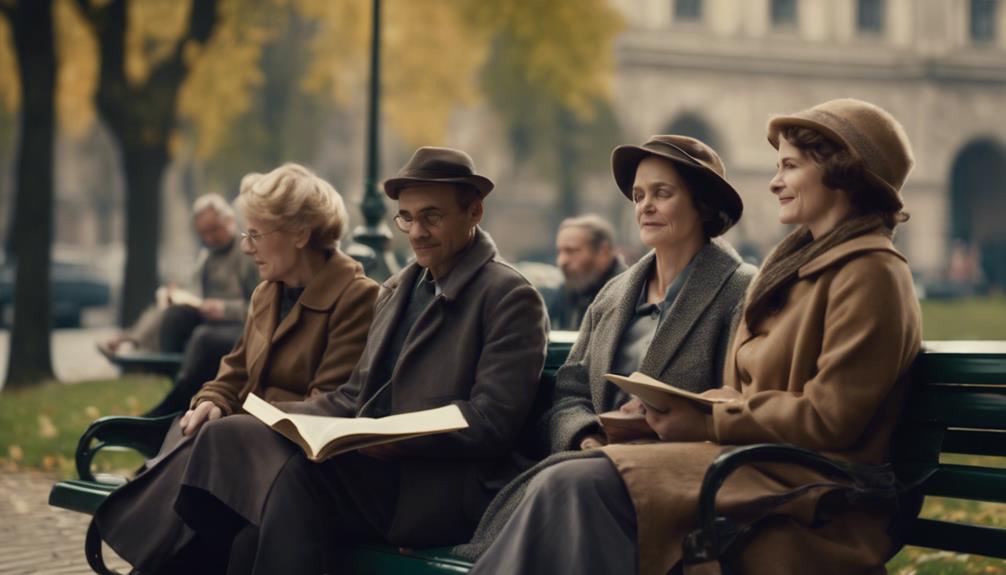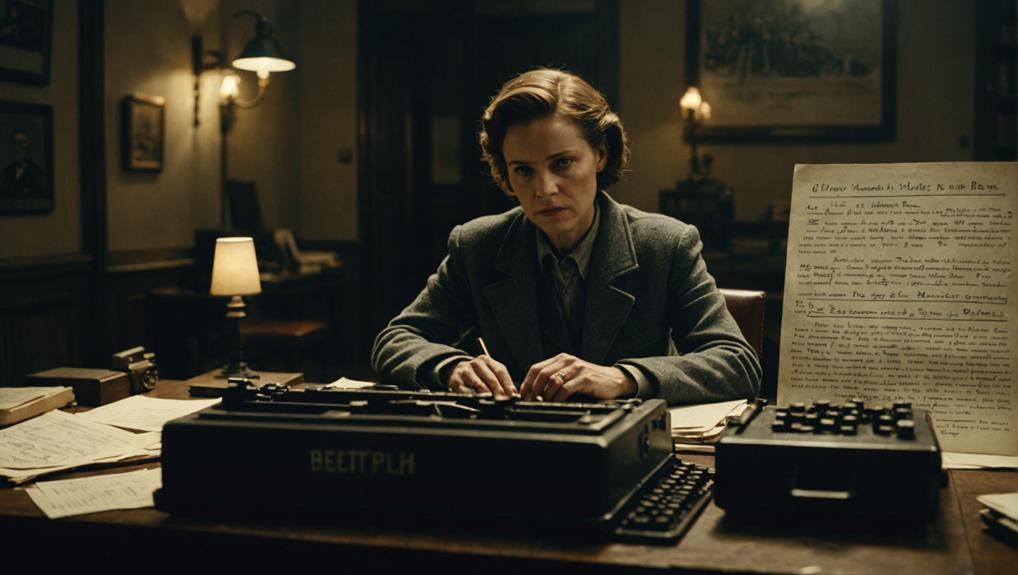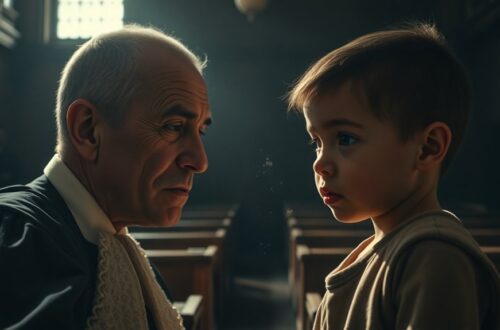Immerse yourself in 'Alone in Berlin,' where Otto and Anna Quangel bravely resist Hitler and the Nazis through defiant postcards after a devastating loss. Follow Gestapo inspector Escherich's pursuit of these resistance messages, leading to a gripping tale of courage and sacrifice. The film's authentic locations and critical acclaim add depth to this powerful narrative of wartime resistance against tyranny. Discover how 'Alone in Berlin' reveals the untold stories of everyday heroes who stood up against oppression, sparking crucial conversations about human resilience in the face of adversity.
Plot Details
In 'Alone in Berlin,' Otto and Anna Quangel engage in resistance against Hitler and the Nazis through a courageous act of defiance following a personal tragedy. The Quangels start writing postcards denouncing the regime and urging others to resist after their son's death in 1940.
Their actions catch the attention of Gestapo inspector Escherich, who's determined to uncover the source of the anti-Hitler messages. Despite the risks, the Quangels continue their resistance, knowing the potential consequences of their actions.
As the plot unfolds, Otto is eventually exposed, arrested, and sentenced to death along with Anna for their defiance. The film concludes with Escherich, who's deeply impacted by the Quangels' unwavering bravery, scattering the postcards and taking his own life.
Through their resistance, the Quangels leave a lasting legacy that challenges the oppressive regime and inspires others to stand up against injustice.
Filming Locations
Principal photography for 'Alone in Berlin' commenced in Berlin in March 2015, capturing authentic settings for the wartime narrative.
The film also utilized locations in Cologne and Görlitz, a German town near the Polish border. Görlitz was specifically chosen for its striking resemblance to the Nazi era, enhancing the film's historical accuracy and atmosphere.
Through these carefully selected filming locations, 'Alone in Berlin' effectively portrays the oppressive environment of living under the dictatorship of the Nazi regime. Each setting contributes to conveying the uncertainty and fear that characterized life during that dark period in German history.
By immersing the audience in these authentic locations, the film brings to life the challenges faced by individuals who dared to resist against the oppressive regime, making the story even more compelling and impactful.
The choice of filming locations plays an important role in shaping the narrative and capturing the essence of resistance during wartime in Germany.
Reception and Reviews

You'll find a mix of opinions surrounding 'Alone in Berlin,' with critics lauding the performances and the film's bold political dissent narrative.
The movie's ratings on Rotten Tomatoes and Metacritic provide a glimpse into the varied reception it received upon debut.
Various reputable sources like Kino-Zeit, Hollywood Reporter, The Guardian, and Variety offer valuable insight into how audiences and critics perceive the film's depiction of resistance against the Nazi regime.
Critical Acclaim Analysis
Amid a spectrum of opinions, 'Alone in Berlin' garnered attention for its portrayal of resistance and political dissent, with critics highlighting the film's examination of fear and courage under dictatorship. Based on Hans Fallada's novel inspired by the true story of Otto and Elise Hampel, who opposed the Nazi regime through a simple act of defiance, the movie explores the complexities of standing up against oppressive forces.
While receiving mixed reviews, the film's theme of political dissent resonated with many, earning praise for its powerful performances and poignant narrative. Premiering at the Berlin Film Festival in February 2016, 'Alone in Berlin' sparked discussions about the bravery of ordinary individuals in the face of tyranny.
Critics from sources like Kino-Zeit, Hollywood Reporter, The Guardian, and Variety commended the film for its nuanced exploration of resistance and the human spirit's resilience in challenging times. The focus on fear under dictatorship and the courage displayed by those defying oppression added layers of depth to the critical acclaim surrounding the movie.
Viewer Response Overview
Opinions on 'Alone in Berlin' were divided among viewers, reflecting a range of responses to the film's portrayal of political dissent and resistance. Based on viewer responses, the film's adaptation of Hans Fallada's book depicting German resistance during World War II was met with mixed reviews. While some viewers praised the performances and the thematic exploration of resistance, others found the execution lacking in certain aspects.
The film premiered at the Berlin Film Festival in February 2016, where its impactful storytelling left a lasting impression on audiences. However, its Rotten Tomatoes approval rating of 57% and a Metacritic score of 52 further underscore the varied reception it received among critics and viewers alike.
Insights from sources like Kino-Zeit, Hollywood Reporter, The Guardian, and Variety offer a deeper understanding of the film's reception and critical analysis, highlighting both the strengths and weaknesses identified by the audience.
Film Adaptations
The film adaptation of Hans Fallada's novel 'Alone in Berlin' vividly brings to life the courageous resistance of Otto and Anna Quangel against the Nazi regime. Directed and co-written by Vincent Perez, the film honors the real-life anti-Nazi activities of Otto and Elise Hampel during World War II.
Premiering at the Berlin International Film Festival, the adaptation received acclaim for its portrayal of wartime resistance. Through the characters of Otto and Anna Quangel, the film showcases the power of small acts of defiance in the face of oppressive regimes. By highlighting the bravery of these lesser-known heroes, 'Alone in Berlin' serves as a tribute to those who stood up against Nazism.
Perez's adaptation captures the essence of resistance and the unwavering spirit of individuals who risked everything to fight for freedom and justice. 'Alone in Berlin' stands as a poignant reminder of the importance of resisting tyranny, even in the darkest of times.
Historical Background

During the turbulent years of World War II, the historical background surrounding 'Alone in Berlin' sheds light on the resistance against the Nazi regime in Germany.
Hans Fallada's novel, published in 1947, highlighted the bravery of individuals who opposed the oppressive regime. Fallada, known for his anti-fascist views, was blacklisted by the Nazis before the war due to his outspoken beliefs. The novel's English translation resonated with readers globally, selling over half a million copies.
The film adaptation, directed by Vincent Perez, explores the pervasive fear and oppression experienced under dictatorship, showcasing writing as a powerful form of resistance against tyranny. Through the lens of Fallada's narrative, audiences are transported to a time when speaking out against the Nazis wasn't only courageous but also a crucial act of defiance.
'Alone in Berlin' stands as a poignant reminder of the importance of standing up against injustice, even in the face of overwhelming adversity.
Director's Vision
With a personal connection to the story of 'Alone in Berlin,' director Vincent Perez aimed to authentically capture the pervasive fear and defiance against Nazism in the film adaptation. Inspired by Hans Fallada's novel and his own familial history of resistance to fascism, Perez sought to honor the bravery of wartime heroes through his work.
By delving into his German roots, Perez felt a deep responsibility to shed light on the struggles of ordinary people living in oppressive times. He conducted thorough research in Germany to guarantee an accurate portrayal of the atmosphere of fear and defiance during the Nazi era, aiming to bring an authentic and poignant depiction to the screen.
Vincent Perez's vision for 'Alone in Berlin' wasn't only a creative endeavor but a personal mission to showcase the courage of those who resisted tyranny. Motivated by his family's defiance against Nazism and the execution of his Spanish grandfather for opposing fascism, Perez's directorial approach was grounded in a heartfelt connection to the themes of fear under Nazism and the resilience of individuals in the face of oppression.
Impact on Readers

Readers worldwide have been deeply moved by the impactful narrative of 'Alone in Berlin,' resonating with over half a million copies sold in English translation. The story's focus on resistance and defiance in the face of oppression has sparked a wave of activism and political engagement among its audience.
Here are three ways in which readers have been impacted by the powerful message of the novel:
- Inspiring Resistance: The tale of ordinary individuals standing up against tyranny has ignited a sense of courage and determination in readers to resist injustices in their own lives.
- Encouraging Defiance: The characters' unwavering defiance in the face of overwhelming odds has instilled a spirit of rebellion and nonconformity in readers, urging them to challenge oppressive systems.
- Fostering Political Engagement: Through its portrayal of individuals taking a stand against authoritarianism, the novel has motivated readers to become more politically engaged, advocating for change and justice in their communities.
Legacy of Resistance
You can see how the legacy of 'Alone in Berlin' continues to resonate through its impact on readers and its historical relevance.
The novel's portrayal of ordinary individuals standing up against tyranny serves as a powerful reminder of the courage and resilience found in the face of oppression.
Through the story of Otto and Anna Quangel, 'Alone in Berlin' inspires a reflection on the enduring legacy of resistance against injustice.
Impact on Readers
The legacy of resistance depicted in 'Alone in Berlin' continues to resonate deeply with audiences worldwide, inspiring a renewed sense of activism and political engagement.
Fallada's narrative, through the English translation, has reached over half a million readers, highlighting the impact of resistance against oppressive regimes. Readers are moved by the story of the working-class couple's defiance, sparking discussions on the power of ordinary individuals in resisting tyranny.
The anti-fascist themes in the novel provoke reflection on historical and contemporary injustices, encouraging readers to stand up against oppression in all its forms.
The emotional depth of the characters and their unwavering courage in the face of adversity leave a lasting impression on those who engage with the novel, fostering a sense of solidarity and a call to action against injustice.
Historical Relevance
Emphasizing the lasting impact of resistance, Hans Fallada's novel 'Alone in Berlin' explores the historical relevance of individuals challenging oppressive regimes, particularly during World War II. The novel's portrayal of resistance to the Nazi regime serves as a poignant anti-fascist narrative that continues to resonate with readers globally.
Through the lens of small acts of resistance, such as the anonymous postcard campaigns depicted in the story, 'Alone in Berlin' sheds light on the courage and determination of ordinary individuals who dared to defy tyranny.
The legacy of 'Alone in Berlin' serves as a powerful reminder of the importance of standing up against injustice, even in the face of overwhelming adversity. By highlighting the resilience and bravery of individuals like Otto and Elise Hampel, who risked their lives to resist the Nazis, the novel inspires hope and showcases the enduring impact of grassroots resistance movements in shaping history.
As history continues to unfold, the lessons of 'Alone in Berlin' remain ever relevant, urging present and future generations to never underestimate the power of resistance.
Conclusion
As you close the book or finish watching the film, you can't help but marvel at the courage and resilience of the characters in 'Alone in Berlin.'
Their story of resistance against oppression serves as a reminder of the power of standing up for what's right, even in the face of overwhelming odds.
Just like them, may you find inspiration to continue fighting your own battles and making a difference in the world around you.




